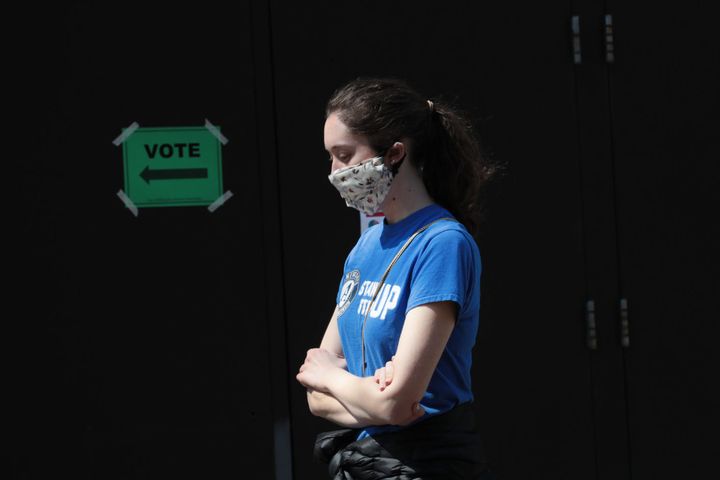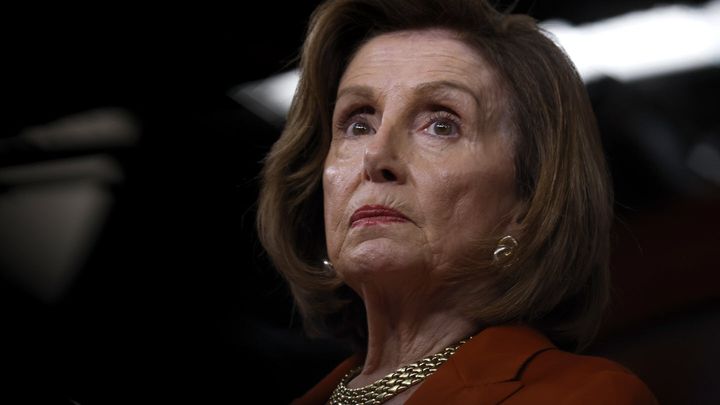Amid the coronavirus pandemic, and after long lines for in-person voting in Wisconsin this month, the word from the White House is that states should not make it easier for voters to mail in ballots safely from their homes.
“Republicans should fight very hard when it comes to statewide mail-in voting. Democrats are clamoring for it,” President Trump said, the day after the Wisconsin election. “Tremendous potential for voter fraud, and for whatever reason, doesn’t work out well for Republicans.” In fact, the public policy institute Brennan Center for Justice has found, the risk of mail-in voter fraud is infinitesimally small.
But while Trump accuses a method he himself used of being “corrupt,” expanding vote-by-mail through “no excuse required” absentee voting programs is being increasingly adopted in states seeking to protect public health while securing voting rights during the pandemic—including many led by Republicans.
The Washington Post counted 16 states where top Republicans have encouraged greater use of vote-by-mail during the pandemic. They include three battleground states with Republican governors and legislatures— Georgia, Iowa, and Ohio—as well as New Hampshire, with a Republican governor. Georgia, for its June 9 election, and Iowa, for its June 2 primary, will mail a ballot application to every voter; New Hampshire dropped the requirement to have an excuse for absentee vote-by-mail in the November general election; and Ohio moved to an almost entirely mail-in election for the state’s April 28 primary.
Several more states with Republican governors and GOP-controlled legislatures have changed their policies to loosen vote-by-mail requirements, including four states that are now proactively mailing absentee ballot requests to registered voters: Idaho, for its May 19 state primary; Nebraska, for May 12; South Dakota, for June 2; and West Virginia, pushed back to June 9.
In still more states, vote-by-mail is being expanded by waiving the requirement for people to have an excuse for voting absentee—an approach overseen by the Republican-led states of Indiana and Alabama, as well as the Democrat-led states of Delaware and Virginia.
Update, April 24: today New York Governor Andrew Cuomo announced an executive order that will send a postage-paid application for an absentee ballot to all registered voters so they can vote by mail in the state’s June 23 election.
The Brennan Center is tracking all 50 states’ preparations for an election during this public health crisis as of April 13.
The existence and spread of this virus should not act as a voter suppression tool.
Helen Butler of the Georgia Coalition for the People’s Agenda, an election protection group
All 50 states allow for some form of vote-by-mail, and in 2018, over 31 million Americans voted by mail, according to a June survey by the U.S Election Assistance Commission. Even before the coronavirus pandemic, two-thirds of states allowed “no excuse” absentee voting, where any citizen can request a mail-in ballot without giving a reason, and five states are primarily vote-by-mail, meaning ballots are sent automatically to registered voters: Colorado, Hawaii, Oregon, Utah, and Washington. The special congressional election in California on May 12 will be held in this way—ballots will be mailed automatically, with 22 drop-off boxes in Los Angeles County and nine in-person voting locations where distancing guidelines will be observed.
Last week, New York and New Hampshire confirmed plans for temporary expanded vote-by-mail to protect public health, with the Granite State’s Republican Governor Chris Sununu striking a different tone than the Trump administration on the importance of providing convenient voting by mail: “If you feel more comfortable voting absentee because of the outbreak or your inability or nervousness about just appearing in person to vote, you can vote absentee.”
However, eight states that have postponed their primary elections still require an excuse for absentee voting, which could suppress turnout if people do not think to request a mail-in ballot to comply with social distancing guidelines. One of them, Kentucky, this week passed a new bill for the November election requiring a photo ID to vote—something that will be difficult to obtain with state government offices closed—which immediately touched off litigation over disenfranchisement. Studies have found that strict voter ID laws like Kentucky’s serve no legitimate purpose, with impersonation fraud at the polls virtually nonexistent, and during this pandemic they could depress turnout in an election year for Senate Majority Leader Mitch McConnell (R-Ky.).
With Kentucky, seven more states compose the “Late Eight” that still require an excuse for absentee ballots, kicking off bouts of legislative scrambling and legal wrangling: Connecticut, Louisiana, Mississippi, Missouri, South Carolina, Tennessee, and Texas.
- In Connecticut, where Democratic Governor Ned Lamont postponed the primary from April 28 until June 2, efforts to adopt vote-by-mail are opposed by the state Republican chairperson. As of April 7, Secretary of the State Denise Merrill has said she intends to mail an absentee ballot application to every voter regardless of an executive order.
- In Louisiana on April 15, a Republican-controlled Senate committee voted down by 5 to 1 the Republican secretary of state’s emergency plan for “no excuse” absentee voting.
- Ahead of Mississippi’s June 23 primary runoff, there is no sign of movement to loosen the state’s strict absentee voting requirements. Three of the “Late Eight” states rated towards the bottom of the Center for Public Integrity 2015 survey of electoral oversight: Mississippi and Missouri each ranked 42nd of 50 states, and Texas at 45th.
- On April 17, civil rights groups led by the ACLU of Missouri filed a lawsuit to allow Missouri voters to request absentee ballots using one of the state’s existing excuses (such as illness) for the upcoming general municipal election, which has been rescheduled for June 2 by executive order. The secretary of state, Jay Ashcroft, a Republican, has so far declined to intervene, while Republican Governor Mike Parson has resisted calls to change the rules. Other plaintiffs include the League of Women Voters and Missouri NAACP.
- As of April 10, South Carolina was evaluating its options ahead of its June 9 state primary. An April 15 study by The American Prospect of the Palmetto State’s presidential primary in February showed how state election infrastructure needs time to ramp up its vote-by-mail programs to ensure fair elections.
- Tennessee, which strictly limits absentee voting for those below age 60, appears intent on holding in-person voting for its August 6 state primary election.
- On April 17, a Texas judge ruled that Texas voters can request and mail in absentee ballots due to concern over COVID-19, issuing a temporary injunction in a lawsuit brought by the Texas Democratic Party. The Texas state attorney’s office filed an appeal.

Funding Push in Congress
In the latest $2.2 trillion coronavirus bailout bill, signed into law on March 18, while Congress allocated hundreds of billions in financing for large corporations, just $400 million went to grants for states to step up safe and secure election practices.
This amount is far short of the $4 billion that election advocates such as the Brennan Center for Justice and Fair Fight see as necessary to scale up secure and accessible elections during the pandemic, with infrastructure as detailed in a plan last month by the nonpartisan 501(c)3 organization, the National Vote At Home Institute. What’s more, due to the funding’s matching requirements and with legislatures out of session, many of the 37 states that have requested assistance so far are having trouble obtaining it.
In Congress, Democratic Senators Ron Wyden of Oregon and Amy Klobuchar of Minnesota proposed their own bill, the Natural Disaster and Emergency Ballot Act (NDEBA), for inclusion in the next coronavirus relief package. The bill’s provisions seek to guarantee no-excuse absentee vote-by-mail in all 50 states, with 20 days of early voting and funding for secure remote voting.
While helping states expand vote-by-mail programs is a common sense step for mitigating the risk of person-to-person transmission of the COVID-19 virus, election advocates point to a remaining need for sanitary physical polling locations to ensure accessibility for all voting communities—some Native Americans, the non-profit Native American Rights Fund notes, face the challenge of not having traditional postal addresses. An April 15 online briefing from the non-profit Joint Center for Political and Economic Studies outlined the areas for ensuring voting accessibility in black communities, including expanded early voting, online registration, and on-site voting that is safe and secure, such as for voters with disabilities.
Voter advocate Helen Butler, executive director of the Coalition for the People’s Agenda, a group that helps lead election protection efforts in Georgia, told Sludge that Congress can safeguard democracy during the pandemic by passing legislation for Election Day voter registration, drop-off ballot locations, and more.
“That means establishing provisions in the next round of stimulus funding to help states pay for universal distribution of vote-by-mail application forms and vote-by-mail ballots; an additional helpful step would be covering the cost of postage on vote-by-mail ballots,” Butler said.
“Statistics are showing that Black Americans in particular, and members of historically marginalized communities generally—people of color and members of low-income and underserved communities—are at a greater risk of catching and succumbing to COVID-19,” Butler said. “To protect these already vulnerable communities when they strive to exercise their rights to vote, state lawmakers should follow in the footsteps of what we’re doing here in Georgia by making it easier to vote by mail. For those who choose to vote in person, voting stations should be sanitized after each use, and voters should be provided with hand sanitizers, gloves, and masks. Polling locations serving populations at greater risk of contracting the virus should be protected with extra care, including providing the capability to drop ballots in safe, secure drop boxes.”



